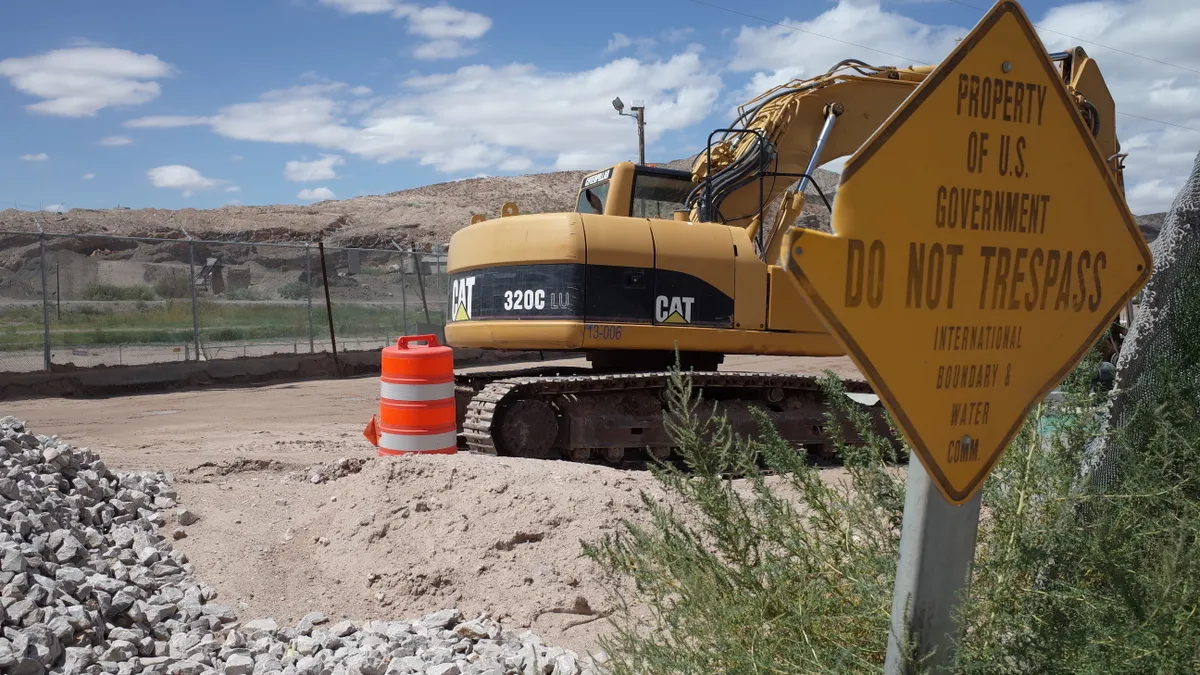UPDATE: Jan. 21, 2021: Making good on a campaign promise, President Joe Biden ordered construction work on the U.S.-Mexico border wall to stop, just hours after he was sworn in yesterday.
In a presidential proclamation, Biden rescinded the national emergency declaration used by former President Donald Trump to divert billions of dollars to the wall from the Defense Department budget. His proclamation directs private contractors to stop work “as soon as possible but in no case later than seven days."
"Like every nation, the United States has a right and a duty to secure its borders and protect its people against threats," the proclamation states. "But building a massive wall that spans the entire southern border is not a serious policy solution. It is a waste of money that diverts attention from genuine threats to our homeland security."
It also calls for an assessment to determine whether its funding sources are legal and whether they can be allocated elsewhere.
"It shall be the policy of my administration that no more American taxpayer dollars be diverted to construct a border wall,” it says. “I am also directing a careful review of all resources appropriated or redirected to construct a southern border wall.”
The proclamation additionally directs federal agencies to formulate a plan within 60 days to redirect border wall funds and resume, modify, or terminate segments of the structure that remain under construction, according to The Washington Post.
Dive Brief:
- Mark Morgan, acting commissioner of U.S. Customs and Border Protection, said earlier this month that stopping construction of the wall along the Mexican border could cost U.S. taxpayers billions of dollars, according to Border Report.
- Morgan said the exact amount of contractual termination fees would have to cover unused but ordered materials and their storage and portions of wall built up until the work stoppage. Installed and uninstalled steel bollards alone are estimated at 270,000 tons. Costs could increase, he added, if contractors are forced to demolish portions of new wall as part of the termination.
- Morgan reiterated those sentiments Dec. 17 via his official Twitter account, writing cancellation also would "force thousands of construction workers to lose their jobs."
Dive Insight:
There are differing opinions on what could happen to border wall construction once Biden takes office.
CNN reported in early December that Biden might not stop construction of projects in progress because contractor and landowner lawsuits and the legalities of government funding rules make that too complicated.
The Army Corps of Engineers, on the other hand, estimates that if the new administration stops wall construction as soon as Biden is sworn into office, the government would save $2.6 billion, according to The Washington Post. As of Jan. 21, 2021 — Biden's first full day in office — there should be $3.3 billion in unused border wall funds, and the Army Corps estimates that construction contract termination costs will be approximately $700 million.
The Army Corps could also choose to modify contracts and allow contractors to continue with the construction of such features as ancillary roads and security surveillance technology, items that the new administration would likely want to see done anyway.
While experts predict how the Biden administration will deal with border wall construction, contractors are working 24/7 to complete a total of 450 miles by the end of December.
Because the federal government has not released information about what kinds of termination liabilities are part of its construction agreements with border wall contractors, no one who is not privy to those contracts can say with certainty how much a parting of the ways will cost.
But if the government does move to terminate some projects, it's unlikely to be a payday for those contractors. Termination-for-convenience provisions vary but typical reimbursements include:
- Labor and materials put in place.
- Stored material that cannot be returned.
- The difference between the purchase price for a piece of heavy equipment and its current value.
- Stabilization of the unfinished project and site.
The government will pay anticipated profit but only for what the project was on track to make, not necessarily what is projected in the contractor's proposal.
As part of the $1.4 trillion 2021 omnibus bill passed this week, Congress has allotted nearly $1.4 billion for border wall construction, according to The Hill.













